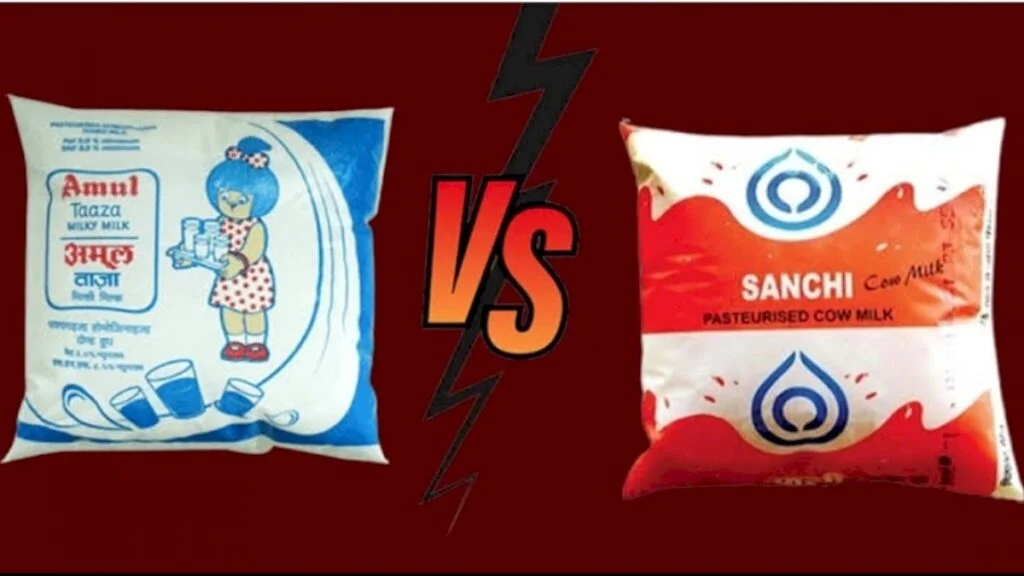
Congress Rajya Sabha MP Vivek Tankha has raised serious concerns over the alleged covert takeover of Madhya Pradesh’s well-known milk production brand ‘Sanchi’ by Gujarat’s renowned dairy brand ‘Amul.’ Through a series of social media posts, Tankha, a legal expert and Congress politician, claimed that a similar attempt was made previously with Karnataka’s ‘Nandini’ brand. He accused the Madhya Pradesh government of caving in to external pressures, potentially compromising the interests of its 7.5 crore citizens for whom Sanchi is a trusted household name.
Tankha’s social media post reads: “The MP government may kneel down, but the 7.5 crore people of MP, for whom Sanchi is a household brand, will protest.” He further stated, “Sanchi is a brand of MP, just like Amul is a brand of Gujarat. Sanchi is being taken over through the back door. Amul has been trying to expand in Madhya Pradesh for a long time; it even set up a big plant but was not able to find a way. MP government, don’t kneel down.”
In response to Tankha’s claims, the Bharatiya Janata Party’s (BJP) Madhya Pradesh media in-charge, Ashish Agarwal, refuted the allegations and accused Tankha of spreading misinformation. Agarwal wrote on social media: “Mr. Tankha ji, do not defame Madhya Pradesh like Jitu Patwari and other Congressmen due to your lack of knowledge. National Dairy Development Board (NDBB) is an undertaking of the Government of India. It has been decided to be give to NDBB the task of operation and efficient management of Sanchi; there is no mention of Amul anywhere in it.”
Agarwal clarified that the decision involves handing over Sanchi to the National Dairy Development Board (NDDB) for modernization and improved production, rather than a direct takeover by Amul. He emphasized that the BJP-led government under Chief Minister Mohan Yadav is committed to making Madhya Pradesh a leader in milk production, moving up from its current third position in the country.
The Madhya Pradesh government released a press statement on Tuesday, detailing Chief Minister Dr. Mohan Yadav’s review of the state’s dairy development strategy, including efforts to increase milk production and the operations of the Sanchi Milk Union. The meeting included key figures such as Alka Upadhyay, Secretary of Animal Husbandry and Dairy, Government of India, and Meenesh Shah, Chairman and Managing Director of the NDDB.
The government’s release stated that it has been agreed that the management and operation of the Madhya Pradesh State Cooperative Dairy Federation, along with its associated milk unions, will be handed over to the NDDB for the next five years. Legal actions and necessary approvals are to be obtained for this purpose. Chief Minister Yadav explained that this move aims to position Madhya Pradesh as a leader in milk production, thereby increasing the income of farmers and cattle keepers. Amendments to the Cooperative Act may also be considered to facilitate these changes.
Chief Minister Mohan Yadav pointed out that Madhya Pradesh currently ranks third in the country in milk production, following Uttar Pradesh and Rajasthan, with a daily output of 5.5 crore liters. He highlighted that the state’s per capita milk availability of 644 grams per day is significantly higher than the national average of 459 grams per day. The government aims to double milk production in the next five years by strengthening the cooperative movement and providing more benefits to farmers and cattle rearers.
The National Dairy Development Board also presented an initial plan outlining how they intend to enhance milk production and collection processes in Madhya Pradesh.
The dispute between the Congress and the BJP over the management of the Sanchi brand reflects broader political and economic tensions in Madhya Pradesh. While the BJP defends its decision as a strategic move for modernization and increased productivity, the Congress warns against the possible undermining of a local brand by external players. As the situation develops, the response of Madhya Pradesh’s citizens and stakeholders will be critical in shaping the future of the state’s dairy industry.







